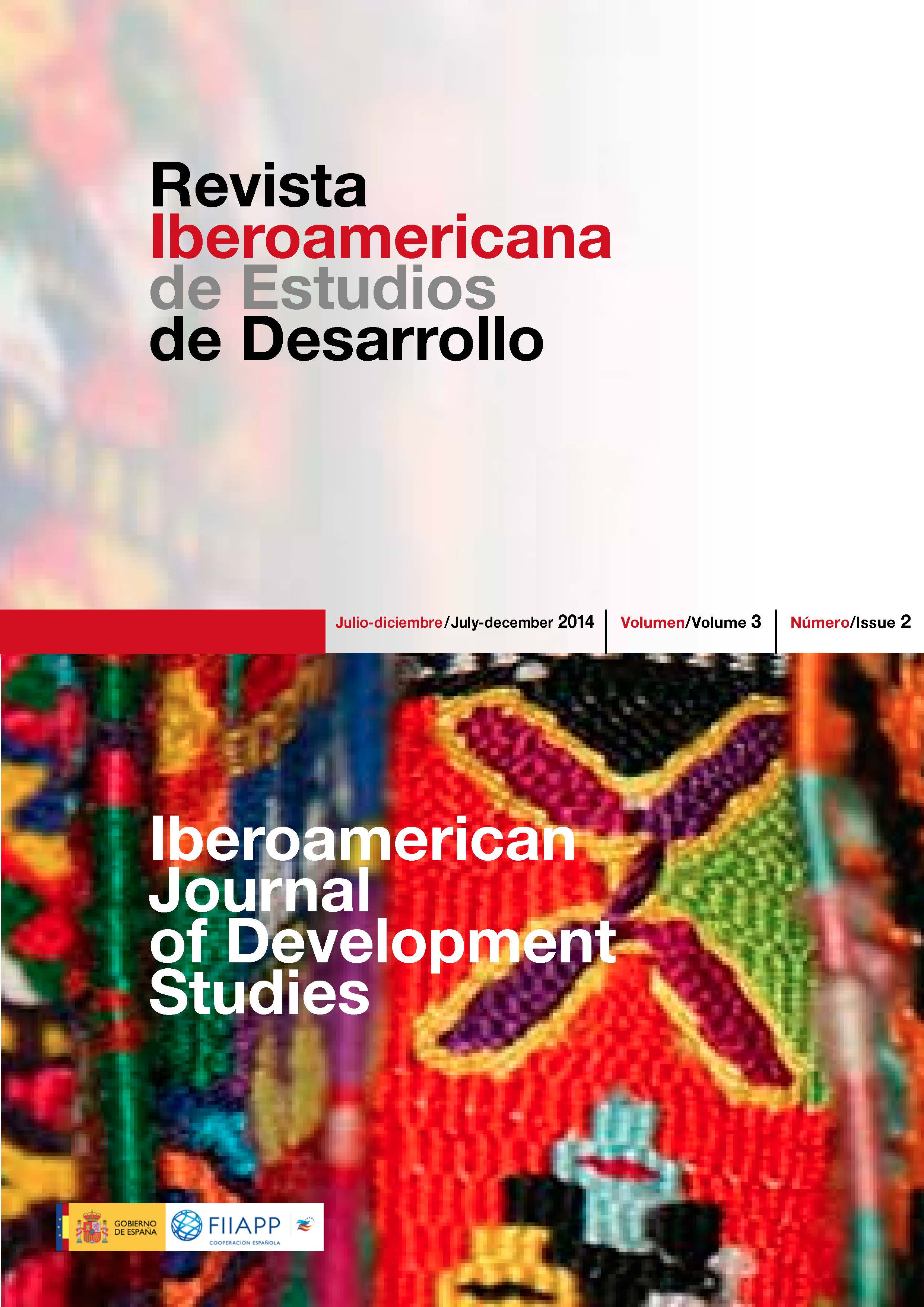Los estados desarrollistas en el este asiático: aportaciones institucionales y límites históricos
DOI:
https://doi.org/10.26754/ojs_ried/ijds.117Palabras clave:
Estado desarrollista, industrialización, desarrollo económico, institucionalidad públicaResumen
El concepto de Estado Desarrollista surgió durante la segunda mitad del siglo XX como hipótesis explicativa al fenómeno de acelerado crecimiento económico de las naciones del este asiático. El argumento central atribuye al intervencionismo estatal en el patrón de inversión la responsabilidad de los exitosos procesos de transformación industrial en la región. Desde la perspectiva de la economía institucional se destacó la aportación al desarrollo económico de determinadas configuraciones de la institucionalidad pública como: la calidad y autonomía burocrática, el desarrollo de una amplia batería de instrumentos de apoyo público a los conglomerados industriales y la condicionalidad de estos incentivos públicos al desempeño privado en materia de productividad y competitividad internacional. Como contrapunto, desde enfoques históricos, se alertó sobre los límites y peligros de exportar estos modelos institucionales a otros países, al asentarse éstos sobre bases espacio-temporales con una alta carga de determinismo histórico.
Descargas
Referencias
AMSDEN A H (1989). Asia's next giant: South Korea and late industrialization. Oxford University Press.
AOKI M, KIM H K, OKUNO-FUJIWARA, M (1998). The role of government in East Asian economic development: comparative institutional analysis. Oxford University Press
APPELBAUM R P, HENDERSON J W (Eds.) (1992). States and development in the Asian Pacific Rim. Newbury Park: Sage Publications
BALASSA B A (1981). The newly industrializing countries in the world economy. New York: Pergamon Press
BARAN P A, SUTCLIFFE R B (1957). The political economy of growth. New York: Monthly Review Press.
BAYAR A H (1996). The developmental state and economic policy in Turkey.Third World Quarterly, 17(4): 773-786
BUCHANAN J M, TOLLISON R D, TULLOCK G. (1980). Toward a theory of the rent-seeking society Texas A & M University Press
BUSTELO P (1998). Teorías contemporáneas del desarrollo económico. Síntesis.
CASTELLS M (1991). Four Asian Tigers with a Dragon Head: A Comparative Analysis of the State, Economy and Society in the Asian Pacific Rim. Instituto Universitario de Sociología de Nuevas Tecnologías, Universidad Autónoma.
COLLIER D (1978). Industrial Modernization and Political Change: A Latin American Perspective. Princeton University Press.
CUMINGS B (1984). The origins and development of the Northeast Asian political economy: industrial sectors, product cycles, and political consequences. International Organization, pp 1-40.
CUMMINGS B (1999). Webs with no spiders, spiders with no webs: the genealogy of developmental state. En Woo-Cummings, M. (eds) The Developmental State, Cornell University, pp. 61-92
CHANG HJ (1999). The economic theory of the developmental state. En Woo-Cummings, M. (eds) The Developmental State, Cornell University, pp 182-199
CHANG H J, PARK, H J, YOO CG (1998). Interpreting the Korean crisis: financial liberalisation, industrial policy and corporate governance. Cambridge Journal of Economics, 22(6): 735-746
CHENERY HB (1960). Patterns of industrial growth. The American Economic Review, 50(4): 624-654
CHIBBER V (2002). Bureaucratic Rationality and the Developmental State. American Journal of Sociology, 107(4): 951-989
DEYO FC (1987). The Political Economy of the New Asian Industrialism, Ithaca, NY: Cornell University Press
DEYO FC (1989). Beneath the miracle: Labor subordination in the new Asian industrialism. University of California Press.
EDIGHEJI O (2010). Constructing a democratic developmental state in South Africa: potentials and challenges‖. Constructing a democratic developmental state in South Africa: potentials and challenges, Cape Town: Human Sciences Research Council, pp 1-33
EVANS PB (1989). Predatory, developmental, and other apparatuses: a comparative political economy perspective on the third world state. In Sociological Forum 4(4) 561-587. Kluwer Academic Publishers-Plenum Publishers.
EVANS PB (1995). Embedded autonomy: states and industrial transformation. Princeton University Press
EVANS PB (1987). Class, state, and dependence in East Asia: lessons for Latin Americanists. The political economy of the new Asian industrialism.
FRITZ V, MENOCAL AR (2007). Developmental states in the new millennium: Concepts and challenges for a new aid agenda. Development Policy Review,25(5): 531-552.
GEREFFI G, DONALD LW (1990). Manufacturing miracles: paths of industrialization in Latin America and East Asia. Princeton University Press.
GERSCHENKRON A (1962). Economic backwardness in historical perspective.Economic backwardness in historical perspective.
HAGGARD S (1990). Pathways from the periphery: The politics of growth in the newly industrializing countries. Cornell University Press.
HAYASHI S (2010). The developmental state in the era of globalization: beyond the Northeast Asian model of political economy. The Pacific Review, 23(1): 45-69.
HERRING RJ (1999). Embedded particularism: India´s failed developmental state. En Woo-Cummings M (eds). The Developmental State, Cornell University, pp 306-334
HUFF WG (1995). The developmental state, government, and Singapore's economic development since 1960. World Development, 23(8):1421-1438.
JENKINS R (1991). The political economy of industrialization: a comparison of Latin American and East Asian newly industrializing countries. Development and Change, 22(2): 197-231.
JOHNSON C (1982). MITI and the Japanese miracle: the growth of industrial policy, 1925-1975. Stanford University Press
JOHNSON C (1999). The Developmental State: Oddisey of a concept. En Woo-Cummings (eds) The Developmental State, Cornell University, pp 32-60
JOMO K S, CHEN YC (1997). Southeast Asia's Misunderstood Miracle: industrial policy and economic development in Thailand, Malaysia and Indonesia. Westview Press
JONES LP, SAKONG I (1980). Government, business, and entrepreneurship in economic development: The Korean case. Harvard University Press
KAY C (2002). Why East Asia overtook Latin America: agrarian reform, industrialisation and development. Third World Quarterly, 23(6): 1073-1102
KOHLI A (1999). Where do hig-growth political economies come from? The Japanese lineage of Korea´s Developmental State. En Woo-Cummings M. (eds) The Developmental State, Cornell University, pp 93-136
KRIECKHAUS J (2002). Reconceptualizing the developmental state: public savings and economic growth. World Development, 30(10):1697-1712
KRUEGER A O (1974). The political economy of the rent-seeking society. The American Economic Review, 64(3): 291-303
KRUEGER A O (1980). Trade policy as an input to development.
KWON H J (2005).Transforming the developmental welfare state in East Asia. Development and Change, 36(3): 477-497
LAL D (1983). The poverty of development economics. MIT Press
LEE EW (1998).The political economy of public sector reform in Hong Kong: the case of a colonial-developmental state
LEFTWICH A (1995). Bringing politics back in: towards a model of the developmental state. The Journal of Development Studies, 31(3): 400-427
LIST F, COLWELL S. (1856). National system of political economy. JB Lippincott & Company
LORIAUX M (1999). The French developmental state as myth and moral ambition en Woo-Cummings M (eds) The Developmental State, Cornell University, pp 235-275
MAXFIELD S, SCHNEIDER BR (Eds) (1997). Business and the state in developing countries. Cornell University Press
MYRDAL G (1957). Economic theory and under-developed regions
NEE V, OPPER S, WONG S (2007). Developmental state and corporate governance in China. Management and Organization Review, 3(1): 19-53
NORTH DC (1990). Institutions, institutional change and economic performance. Cambridge university press
NURKSE R (1953). Problems of capital formation in underdeveloped regions
ÖNIŞ Z (1991). The logic of the developmental state. Comparative Politics,24(1):109-126
PEMPEL TJ (1999). The developmental regime in a changing world. En Woo-Cummings, M. (eds) The Developmental State, Cornell University, pp 137-181
PREBISCH, R (1963). Towards a dynamic development policy for Latin America. United Nations.
RADICE H (2008). The developmental state under global neoliberalism. Third World Quarterly, 29(6): 1153-1174
RIAIN S (2000). The flexible developmental state: globalization, information technology and the Celtic Tiger. Politics and Society, 28(2):157-193
RODRIK D (2004). Industrial policy for the twenty-first century.
SLATER D (2005). Systemic vulnerability and the origins of developmental states: Northeast and Southeast Asia in comparative perspective. International Organization, 59: 327-361
SINDZINGRE A (2004). Bringing the developmental state back in: contrasting development trajectories in sub-Saharan Africa and East Asia. George Washington University.
STIGLITZ JE (1996). Some lessons from the East Asian miracle. The World Bank research observer, 11(2): 151-177
VARTIANIEN J (1999). The economics of successful state intervention in industrial transformation en Woo-Cummings M (eds) The Developmental State, Cornell University, pp 200-234.
WADE R (1990). Governing the market: Economic theory and the role of government in East Asian industrialization. Princeton University Press
WADE R (1998a). The Asian debt-and-development crisis of 1997: causes and consequences. World development, 26(8): 1535-1553
WADE R (1998b). From ‘miracle to ‘cronyism’: explaining the Great Asian Slump. Cambridge Journal of Economics, 22(6): 693-706
WESTPHAL LE (1990). Industrial policy in an export propelled economy: lessons from South Korea's experience. The Journal of Economic Perspectives, 4(3): 41-59
WHITE G, GRAY J (1988). Developmental States in East Asia. Macmillan
WOO JE (1991). Race to the swift: State and finance in Korean industrialization. Columbia University Press
WORLD BANK (1993). East Asian Miracle: Economic Growth and Public Policy. World Bank Group.
Descargas
Publicado
Número
Sección
Licencia
Derechos de autor 2014 Fernando De-la-Cruz-Prego

Esta obra está bajo una licencia internacional Creative Commons Atribución-NoComercial-SinDerivadas 4.0.



